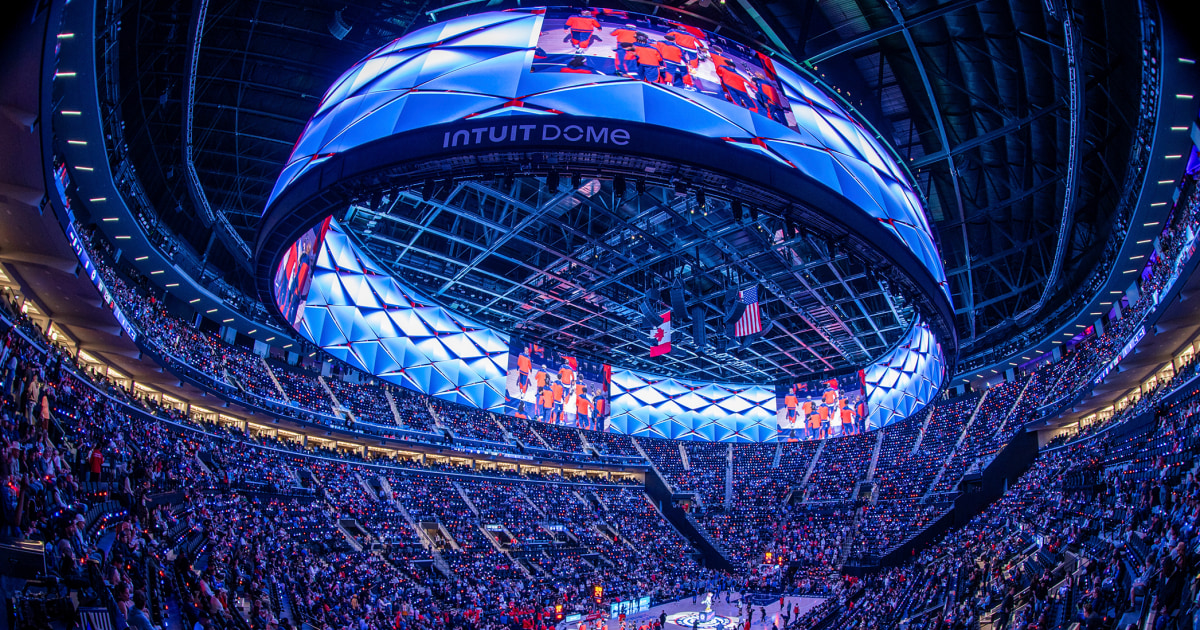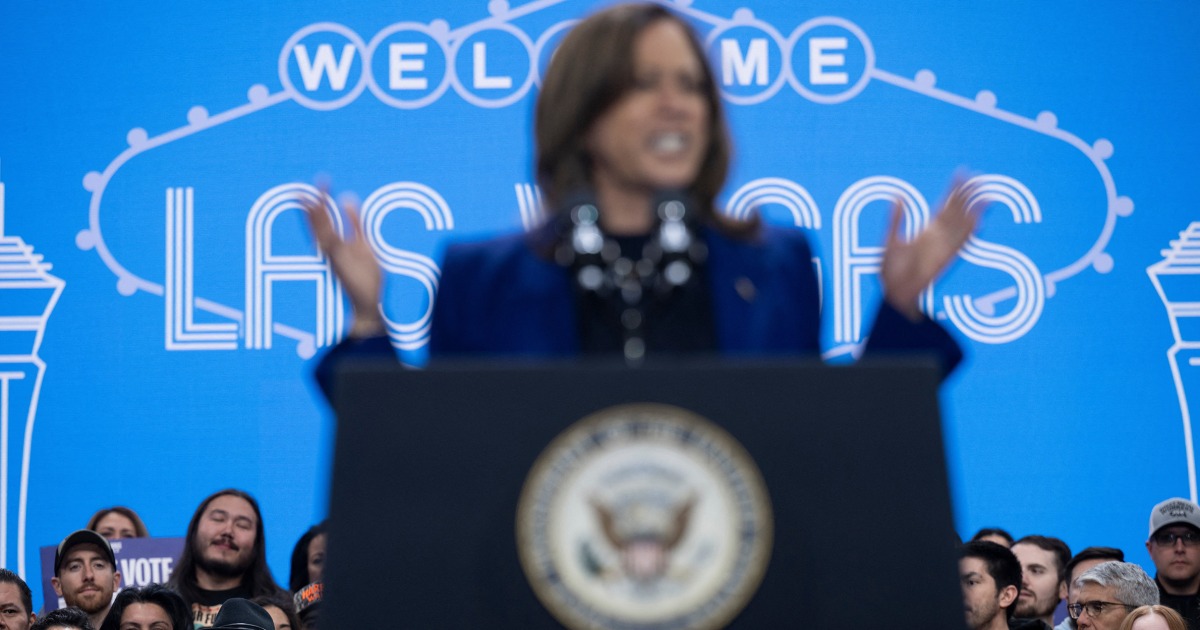
INGLEWOOD, Calif. — Inside what may be the world’s most technologically advanced stadium, one of the clearest indications that things are different is heard in its restrooms. Unlike many professional sports stadiums that pipe audio of the game broadcast into restroom speakers, Intuit Dome, the brand-new home of the Los Angeles Clippers, plays a different soundtrack for fans using its more than 1,100 touchless toilets and urinals: pop music.
The choice was intentional. Although Steve Ballmer, the former Microsoft chief executive who has owned the Clippers since 2014, designed the $2 billion arena to include bells and whistles, he primarily wanted a place for exuberantly passionate fans of basketball, like him. To create that, incentives intended to get fans “back to their damn seats,” as Ballmer once said , were baked into the design — including, but not limited to, a lack of restroom play-by-play.
The result is an arena with ambitions as lofty as the franchise’s dreams of winning a first NBA championship. Intuit Dome wants to rewire fans’ habits and change the way they’re used to rooting for the home team. “It feels kind of like an NBA Disneyland, versus [Crypto.
com Arena, the Clippers’ former home, shared with the Los Angeles Lakers] where it’s a multiteam, multisport arena,” said Oscar Burrows-Rangel, a longtime Clippers fan. “This is dedicated to basketball, and everywhere you look, you know you’re at a basketball game. You know you’re at a basketball arena.
You know you’re here for the game.” Across professional sports, the game can feel secondary as teams court the spending of more casual fans. Wide-open concourses with views of the court encourage wandering.
When the Phoenix Suns finished their $240 million home arena renovation in 2021, they added what has been described as the largest sports bar in Arizona, a 60-foot-long bar in one corner of the concourse, overlooking the court. State Farm Arena, in Atlanta, houses a bar accessible to its highest-paying customers that sits on the arena’s literal hardwood floor, only feet from the benches. Ballmer included big, show-stopping attractions, too, led by a halo scoreboard with the equivalent of an acre’s worth of LED lighting.
An 80,000-foot plaza outside the main gate includes a court for pickup games. Just as unique, however, are the design choices that earn less attention but also affect the customer experience, said longtime Clippers fans who attended the Oct. 23 regular-season opener, against Phoenix.
When the game begins, even the priciest bunker suites on the court level at Intuit Dome don’t feature big-screen televisions — a nudge to get fans into the suites’ seats if they want to watch James Harden run pick-and-rolls with Ivica Zubac. To reduce the time fans want to spend out of their seats, Ballmer pushed to make them more comfortable to sit in, by increasing the leg room, and closer to the action, with a fan in the 20th row about 45 feet closer to the court than at the Clippers’ previous arena, according to the team. Each of the 17,927 seats includes a microphone to determine which fans are cheering the loudest — a measure that can earn fans rewards later — and a four-button controller.
Inspired by Microsoft’s Xbox, the directional controller is embedded into the armrest to allow fans to take part in games on the scoreboard during breaks in play. According to a team spokesman, just over 80% of the armrest controls had been used after two preseason games and the Oct. 23 regular-season opener, against Phoenix.
Ballmer has also acknowledged being obsessive over cutting down lines. He has said the number of toilets and urinals is three times the number in the average NBA arena. Concession stands incorporate facial recognition to allow fans who have linked their wallets to the arena’s app to walk in and out, bypassing registers.
“You kind of know that you can leave and come back without having to miss too much of the game,” Burrows-Rangel said. To sit in “The Wall,” a 51-row section rising at a steep pitch from close to the opposing team’s bench to the stadium’s uppermost row, fans must pass a certification test to prove they are Clippers fans. Within The Wall is a 13-row supporters’ section directly behind the basket with European soccer-inspired elevated handrails to encourage fans who want to stand.
Erica Okeith, who has watched the team since it played in the Los Angeles Sports Arena more than a quarter-century ago, was among the fans who watched the first regular-season game against Phoenix from the supporters’ section. She had to agree to terms that reward rabid fandom. The first 175 fans with passes to the section who arrive at least an hour early get complimentary parking.
Also, the earliest arrivals earn seats closest to the court. But those who no-show on their supporters’ section reservations more than five times can have their passes canceled. “I am the type of fan that likes to stand up at games, anyway, and in other places in the arena typically other fans don’t like that,” Okeith said.
“For me to be able to know I can stand up and no one’s going to tell me to sit down or have an issue with it is a benefit for me.” Suns star Kevin Durant complimented the Wall design as “insane” after having played in the arena’s first regular-season game, and Okeith noticed Clippers players, too, acknowledging fans in the section. Standing throughout the game wasn’t mandatory, but it was the intention, she said.
Okeith noticed fans in other sections following the lead of the supporters’ section’s chants and movements and believes it will catch on. In the upper rows of The Wall sat Jason Holzgang, 24, who has attended Clippers games since 2005. When details about The Wall were released years earlier, Holzgang was skeptical about how much of a home-court advantage it would provide.
But in his first game, he already felt his usual in-game habits changing. “With me in The Wall, I’m like, ‘I got to keep screaming, I got to keep screaming,’ when usually I would kind of chill,” Holzgang said. Kinks were still being smoothed out in the arena’s opening week of the regular season.
Some customers reported some difficulty with the frictionless payment system at the grab-and-go concession stands, unable to walk out at first as expected. Some who had linked their wallets and ages in the app and expected to be able to purchase alcohol using only its “GameFace ID” facial recognition software said they were told they needed their physical identification. After it sold out of some merchandise and apparel items quickly, the team was trying to improve its real-time inventory tracking, the team spokesman said.
Some fans saw improvements after the opening game, but others were vocal on social media about issues that had persisted in how the app and the touchless checkouts worked. One of the most significant elements about watching a Clippers game that Ballmer aims to change involves what is heard, and what isn’t, in other parts of the building. For years at Crypto.
com Arena, large fan bases supporting opposing teams, such as Golden State, New York or Boston, would often drown out the noise created by home fans. It was why, for Daniel Albitres, one of the first signs that things might be different came when word spread throughout The Wall on Oct. 23 that ushers had removed a fan who had tried to sneak in a Suns jersey for violating the policy against wearing gear of the opposing team in the supporters’ section.
Albitres looked around him and saw only Clippers gear. That was a first. “It’s nice to have a spot where you know you’re going to have your fans,” Albitres said.
“For the first time, I saw someone with another jersey get kicked out. It was probably the highlight of my day.".














